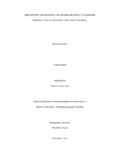
Please use this identifier to cite or link to this item:
https://hdl.handle.net/20.500.14301/263| Title: | PERCEPTION AND PRACTICE OF GENDER FRIENDLY CLASSROOM INTERACTION IN ENGLISH LANGUAGE TEACHING |
| Authors: | Adhikari, Mandira |
| Citation: | Adhikari,M.(2013).Perception and practices of gender friendly classroom interaction in English language teaching |
| Issue Date: | Nov-2013 |
| School: | SOED |
| Department: | DOLE |
| Level: | Masters |
| Program: | Master of Education in ELT (2 years) |
| Abstract: | Gender concern in classroom has been given priority for the last two decades in Nepal. Most existing literature on gender inequality is based on artifacts. This study intends to go beyond the existing gender related artifacts literature to gain a comprehensive understanding of espouse beliefs and underlying beliefs on gender inequality focusing on social and cultural components. This research thus aims to explore Nepalese students’ and ELT teachers’ perceptions and practices of gender friendly classroom interaction. The study has adopted a qualitative research approach in order to provide a more holistic and comprehensive view of the research participants regarding gender friendly classroom interaction in order to get individuals to reflect thoughtfully about what they would see, feel and believe regarding the overall concept and practice of gender friendly classroom interaction. So, meaning oriented methods like in -depth interview and classroom observation were the main approaches of data collection to explore the experiences of Nepalese teachers as well as Nepalese students. The findings of this research reveal that Nepalese students are not feeling easy to interact in the class especially the female students having low proficiency in English language. Similarly, though students are aware of using English language in the classroom, having low proficiency in English has created a massive problem in the classroom. Students try to use English language in their classroom to deal with the difficulty in classroom interaction in the English classroom. Similarly, teachers’ understanding on gender friendly classroom is a classroom where teacher provides equal opportunity to both the genders in different activities .Though gender biasness is still in existence in Nepalese English classroom, the practice of Nepalese English teachers’ in their real classroom varies on what they have expressed in their interview as Nepalese teachers are not practicing gender friendly classroom interaction. Finally, I have presented the conclusion of this study along with my learning experiences during the journey of my dissertation. |
| URI: | https://hdl.handle.net/20.500.14301/263 |
| Appears in Collections: | Research Report |
Files in This Item:
| File | Description | Size | Format | |
|---|---|---|---|---|
| Mandira thesis.pdf | 1.24 MB | Adobe PDF |  View/Open |
Items in DSpace are protected by copyright, with all rights reserved, unless otherwise indicated.